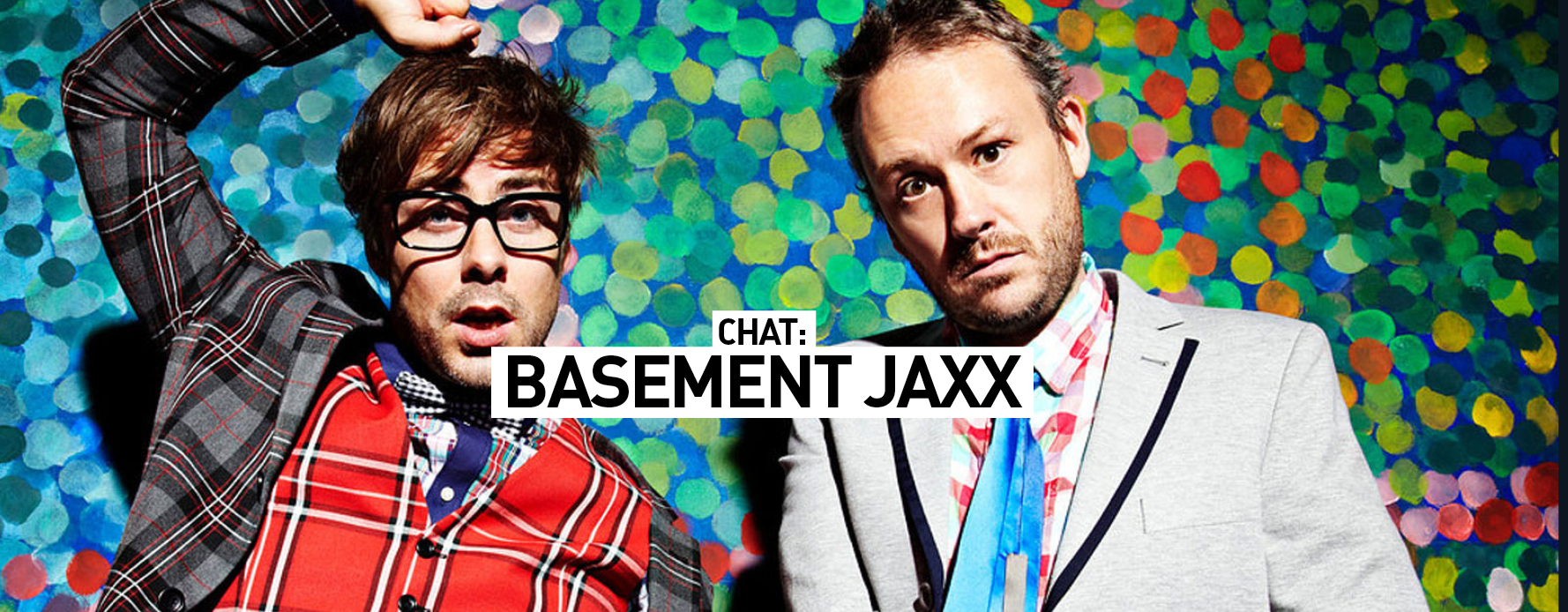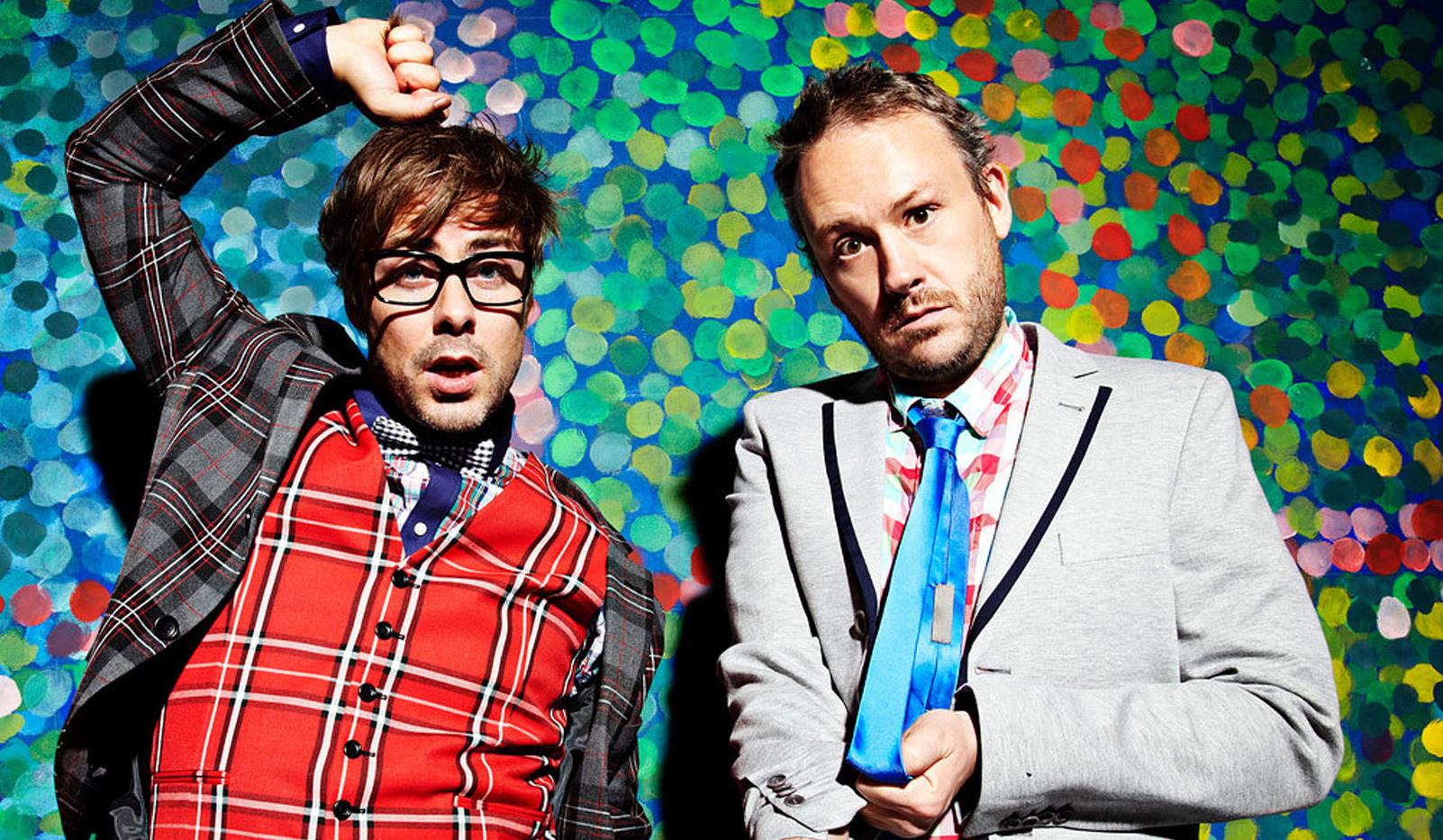Basement Jaxx: Spiritually Reformed
 Thirsty for JUICE content? Quench your cravings on our Instagram, TikTok and WhatsApp
Thirsty for JUICE content? Quench your cravings on our Instagram, TikTok and WhatsApp

Ever since the ‘90s, Simon Ratcliffe and Felix Buxton have established a highly regarded name in the UK’s electronic scene with a repertoire of albums that range from fluorescent dance anthems that have become the earmark of Jaxx to darker endeavours as dabbled on 2009’s Scars. Their pioneering talent has gotten them a variety of collaborative works with legendary artistes the likes of Siouxsie Sioux, Cyndi Lauper, and Yoko Ono as well as offers to score films, such as the cult alien apocalypse flick Attack The Block. Though they have kept busy in the interim before their new album Junto, Buxton had a UFO sighting (!) that led him to reevaluate his spiritual notions and other philosophical conundrums, which was one of the factors that resulted in an album that reverberated Jaxx’s past, but also indicated their reformed sound and outlook. Due in part to their longevity in the industry, they have an astute sense of how culture has evolved, or rather imploded into, and have strived to showcase overlooked facets of pop culture to their fans with their wide-reaching fame. JUICE had the chance to speak to one half of Basement Jaxx, Buxton naturally, as he mused over the aforementioned matters.
The new album, Junto, which means “together”, has a spiritual and positive message to it. What inspired it?
I think it was trying to make an album of music that is positive and to spread good vibrations; everything in the world is connected. So, the idea was to produce music that has a positive impact like dominos. When you play dominos, you knock one domino with a positive force and that knocks the next thing into a positive force. For example powertothepeople.fm, the website, we have the Indonesian version there from Jakarta with kids, and that project is very much a project for people from different countries to do a version of the song [‘Power to the People’], showing that we are all connected. It’s just different in the languages and in genres, but really it’s all the same. That we all are one and the album, the heart of the album is very much about that.
And touring around the world has largely influenced this message?
I think it has always been at the core of the Basement Jaxx’s philosophy. When I started… when we were doing Remedy, our first album, I was very keen [on it already] – it was called Remedy because it was about healing and the cover had black and white bodies all together; it was about unity. So, it has always been there in the beginning. But probably, in the beginning it was an idea, not due to experience and not having seen different tangents in the world. It was all just a picture, a little snapshot from a street in Brixton, in the inner cities. Since then, we have travelled around the world and met people from different cultures and different ways of thinking and different perspectives. It’s very much about that.
While making the album you guys had changed studios to a place where it had windows and was more open. The setting was reflected in the album, but what was your state of mind during that period?
We’ve been in a dark room with no windows, probably why the Scars album we did [previously] was darker, and then we moved to a new place to get fresh air, to get light. The idea was to really try to do something more positive and to make a positive mood and to do music that connected to our Jaxx’s fans, and also to the new wave of people who are into house music. Because a lot of the young people and DJs we were meeting – you know from Rudimental to Disclosure – they were all fans of our music. So, it seemed like we should do something that connects with that. I suppose around that time before the album, I’ve done a lot of doing into my spiritual beliefs and looking into different religions and different perspectives. And I was also lucky enough to see a UFO, which was very exciting, and that led me to do loads and loads of research, reading a lot about possible other dimensions, the fifth dimension, and yeah, other possibilities in life, which I found it really exciting and was kind of an epiphany. I did a talk in Oxford University [about it], that was the main thing that happened to me and I really wanted to know what I was talking about because there [at Oxford], you have very, very intelligent people.
Was it also connected to the album’s logo, the sacred geometry?
Yes, that’s right. That was created by [Heather Smales]. She was a fan of Basement Jaxx and we did a design competition for students. When we were starting the Power to the People Project, I thought she’d be great to create a logo. She created a few things and she produced the “Juntos”, as we called it. That seemed to be a really great symbol of something new and something fresh. It seemed to symbolise the idea of a new leaf, of a new kind of phase. We were very keen to do something that wasn’t chaotic and aggressive, which maybe some of the early Basement Jaxx stuff did have.
Basement Jaxx has a ballerina on tour and people are crazy for it. You did it to promote culture you guys personally enjoy, why did you guys feel the need to do so?
People can be very narrow-minded of their view of what they think is cool or not cool. Ballet is beautiful. The girl that was touring with us, she is the director of the Royal Ballet in England. So, she’s really good. For people who might not see ballet and to see it being done beautifully and not see it as something different, to me, is great. We should learn to appreciate all these different possibilities and facets of what artistic expressions can be.
The video for ‘Never Say Never’ features a Twerkbot, the message was to encourage dance and love, but was it also slightly mocking twerking as the cultural phenomenon it has become?
Yeah, slightly. In the beginning we were talking to the director Saman [Kesh] about the video, I was very worried about the twerking thing because that’s become very much part of popular culture, which some will say “great, go and do it because people can relate to it.” I don’t know. I was very worried about that being the main focus of the video. [But] Saman seemed to have such belief in the video that he was doing and such a visual aesthetic, I don’t know, I trusted him and said okay, we’ll go for it. The story changed a bit. Initially, I think it was maybe just one woman or just one man, and there wasn’t any relationship there cause with the song ‘Never Say Never’, it is about love and about the fact that you can have an incredible thing with someone but maybe you won’t be together. It was a bittersweet thing and you’re not saying that maybe something may happen in the future, who knows. None of us know about life and we can’t… sometimes we just have to let it go and let things fall into place naturally. So in a way, the video became nothing to do with the core lyrics of the song, which is fine. That’s the kind of modern world we live in and everything can be looked at from a different angle.
How did you guys get into the business of film scoring?
Well, basically we got asked to do it and we said yes. It was great working on Attack the Block and we really enjoyed it. We had said to him [the director], we wouldn’t work on the film score, we’d only give him a theme tune. But I don’t know, somehow we ended up doing music throughout the whole film. And also actually The Hooping Life was the same. We told them we’d give them a theme song but not do music for the whole film. But, they actually came over from America and came to the studio and tried to get us to finish music for different scenes and stayed with us for three days, and we then finished the whole film.
So as of now, you guys have not personally chosen to do specific film projects?
We’re open to it. If anyone approaches us, you never know, we might do it. It all depends. Now, we’ve finished this album, we are kind of open to new ideas and projects. I was working with an acapella choir last week and I did an event for blind awareness in London. The whole audience had blindfolds over their eyes to kind of try experience what it must be like hearing music and moving around in a space when you can’t see anything. So, there are always new ideas around and things to do, but maybe not for the creative mainstream.
Speaking of the blind awareness, what spurred you to do more charitable works such as the Power to the People Project?
I think it’s important to all of us to do things where we volunteer, where it’s not about money and instead with the incentive of trying to do something for humanity, for the greater good, for a higher purpose. I think that it’s good to be a balanced human being because we’ve got so consumed by commercialism, and kind of greediness and this whole bling culture – it’s empty. You know there’s so much depression, dissatisfaction. It’s because people aren’t connecting to the bigger picture and realising that actually all of us, as human beings, we’re all linked together and every action we make is connected to every other action in the world, whether it’d be nature or the cosmos.
Finally, what can people expect from Basement Jaxx’s set for It’s The Ship?
It won’t be a live set. It will be a DJ set. You’ll be brought down to the Basement Jaxx world, we’ll get your body and mind moving… And we’ll be on a ship, that’s already quite exciting in itself (laughs).
Junto is out now via Atlantic Jaxx and PIAS. Basement Jaxx is set to perform at the inaugural cruise festival It’s the Ship, happening from Friday 21 to Tuesday 25 November ’14.

 Get Audio+
Get Audio+ Hot FM
Hot FM Kool 101
Kool 101 Eight FM
Eight FM Fly FM
Fly FM Molek FM
Molek FM